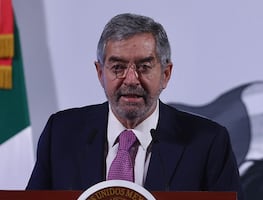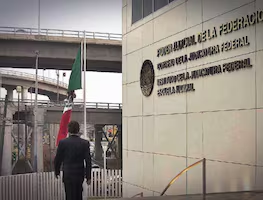Más Información

Trump desata una confrontación interna en México por declarar terroristas a los narcos; Sheinbaum acusa de “entreguismo” a oposición

Avanza repatriación a México de connacionales secuestrados por huitíes; reciben asistencia y protección consular
Suspected chemical attacks
over the weekend killed at least 60 people and wounded more than 1,000 in Syria’s rebel-held eastern Ghouta , a Syria medical relief group said on Monday.
The death toll is likely to rise, according to the Union of Medical Care Organizations , a coalition of international aid agencies that funds hospitals in Syria and which is partly based in Paris.
“The numbers keep rising as relief workers struggle to gain access to the subterranean areas where gas has entered and hundreds of families had sought refuge,” the group said in a statement.
Doctors and witnesses have said victims showed symptoms of poisoning , possibly by a nerve agent , and reported the smell of chlorine gas .
Thus, the United States and other Western powers are considering taking military action over the suspected poison gas attack on Saturday on a rebel-held Syrian town that long had held out against President Bashar al-Assad’s forces .
International chemical weapons experts will go to Douma to investigate the suspected poison gas attack, their organization said on Tuesday, as the United States and other Western powers consider military action over the incident.
The Organisation for the Prohibition of Chemical Weapons ( OPCW ) chief, Ahmet Uzumcu , said it was responding with “grave concern” to the suspected chemical weapons attack outside Damascus.
The OPCW’s fact-finding mission, which was already investigating the use of chemical weapons in Syria’s civil war, was gathering all available material to establish whether chemical weapons were used, it said in a statement.
Part of the Hague-based OPCW’s work will be to clarify what chemical agent may have been used, including the possibility that a cocktail of toxins may have been dropped on the neighborhood.
The Syrian government denied its forces had launched any chemical assault, and Russian Foreign Minister Sergei Lavrov said such allegations were false and a provocation .
Professor Raphael Pitti, a doctor who viewed videos taken at the scene, said patients appeared to have had convulsions more typical of sarin poisoning .
“Everything suggests that during the second attack, chlorine was used to conceal the use of sarin at the same time,” Pitti said.
A doctor at the scene said some patients had also suffered from hemoptysis or coughing up blood, a symptom that has never been seen in previous chemical attacks in Syria.
A joint United Nations-OPCW investigation determined in 2016 and 2017 that Syrian government forces used chlorine and sarin repeatedly throughout the civil war.
sg
Noticias según tus intereses

Confiesan pago por preguntas en la Mañanera | El Universal

Bomberos "doxean" a Regina Blandón y desatan memes

Gene Hackman y su esposa son hallados muertos en su casa de Nuevo México; se desconocen las causas

Sheinbaum se lanza contra Anabel Hernández por caso del “El Mayo” Zambada y abogado; su periodismo es ficción, dice

Estas son las 3 carreras universitarias que ya no se recomiendan estudiar; afirma la Inteligencia Artificial










